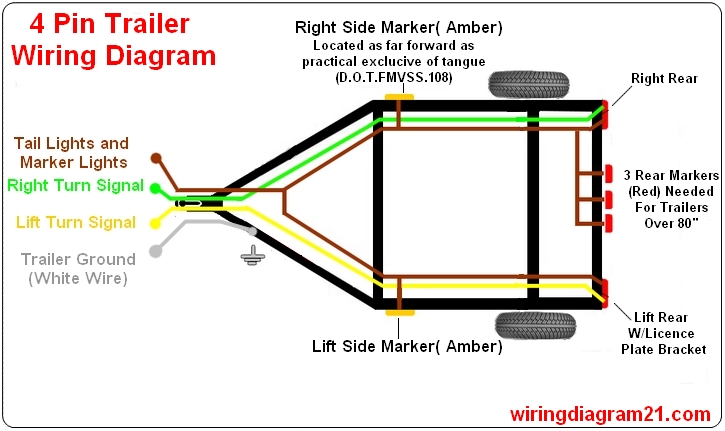Ever feel limited by your trailer's basic lighting functions? Wish you could add electric brakes or other powered features? The solution might be simpler than you think: upgrading your trailer wiring from a 4-wire to a 7-wire system. This seemingly small change can unlock a whole new world of towing capabilities, enhancing both safety and convenience on the road.
A 4-wire system provides the basic necessities: tail lights, turn signals, and brake lights. However, a 7-wire setup goes further, offering connections for electric trailer brakes, a 12V auxiliary power line, reverse lights, and even a ground for additional accessories. This transformation allows you to tow larger trailers, control their braking independently, and power various devices like winches or interior lights.
The transition from a 4-wire to a 7-wire system isn't just about adding more wires. It's about evolving your towing setup to match your ambitions. Whether you're hauling a boat, camper, or heavy-duty equipment, this upgrade can make a significant difference in your overall towing experience.
Historically, 4-wire systems were sufficient for simpler trailers with minimal electrical demands. As trailers became more complex and featured more advanced functions, the need for a more comprehensive wiring system became evident. The 7-wire system emerged as the solution, providing the necessary connections for these advanced features and paving the way for safer and more versatile towing.
One of the primary reasons to consider a 7-wire upgrade is the addition of electric trailer brakes. For heavier trailers, electric brakes are not just beneficial, they are often essential for safe and controlled stopping. The 7-wire system provides the dedicated connection needed for these brakes to function correctly, preventing your towing vehicle from being overwhelmed by the trailer's momentum.
The 7-wire trailer connector, often referred to as a "7-way" or "7-pin" connector, provides separate connections for each function. These typically include: right turn/brake, left turn/brake, tail lights, ground, 12V auxiliary power, electric brakes, and reverse lights. A 4-wire system, in contrast, combines the turn and brake signals for each side, using only four wires.
Benefits of a 7-Wire System:
1. Enhanced Safety: Electric brakes offer superior stopping power, particularly with heavier trailers, improving control and reducing the strain on your towing vehicle's brakes.
2. Increased Versatility: The 12V auxiliary power line can power various trailer accessories, such as interior lights, winches, or even a small refrigerator.
3. Improved Functionality: Dedicated reverse lights provide better visibility when backing up with a trailer, making maneuvering in tight spaces safer and easier.
Advantages and Disadvantages of 7-Wire Upgrade
| Advantages | Disadvantages |
|---|---|
| Improved safety with electric brakes | Higher initial cost compared to 4-wire |
| Powering additional accessories | More complex installation |
| Enhanced functionality (reverse lights, etc.) | Compatibility issues with older vehicles |
Frequently Asked Questions:
1. Can I install a 7-wire system myself? Yes, with the right tools and some basic wiring knowledge.
2. What tools do I need for the upgrade? Wire strippers, crimpers, electrical tape, connectors, and potentially a drill.
3. Where can I purchase a 7-wire connector kit? Auto parts stores, online retailers, and RV supply stores.
4. Is it difficult to wire a 7-way connector? It requires some electrical knowledge, but numerous online resources and tutorials are available.
5. Do I need a special adapter to use a 7-wire trailer with a 4-wire vehicle? Yes, adapters are readily available.
6. Can I use a 7-wire trailer with a 4-wire vehicle without an adapter? No, it won't function correctly without the appropriate adapter.
7. What is the most common issue when converting to 7-wire? Incorrect wiring, leading to malfunctioning lights or brakes.
8. How can I troubleshoot wiring problems? Use a test light or multimeter to check for continuity and proper voltage at each connection.
Tips and Tricks: Use color-coded wires to simplify the wiring process. Always disconnect the battery before working on any electrical system. Double-check all connections before testing the system.
Upgrading your trailer from a 4-wire to a 7-wire system offers substantial benefits, from the enhanced safety of electric brakes to the added versatility of powering accessories. While the process might seem daunting, with the right resources and a little patience, it's a manageable upgrade that can significantly improve your towing experience. This upgrade not only expands your towing capabilities but also ensures safer and more controlled hauling. Whether you're a seasoned towing pro or just starting out, consider making the switch to a 7-wire system. It's an investment in safety, convenience, and the overall enjoyment of your towing adventures. Don't wait until you encounter a challenging towing situation; upgrade today and experience the difference firsthand.
Rv Wiring Color Code - Trees By Bike
Utility Trailer Wiring Diagram 7 Way - Trees By Bike
trailer 4 wire to 7 wire - Trees By Bike
Wire Diagram For Trailer Lights - Trees By Bike
Wiring In Trailer Lights - Trees By Bike
Chevy Truck 7 Pin Trailer Plug Wiring Diagram - Trees By Bike
Trailer Lights Wiring Diagram 7 Plug - Trees By Bike
Wiring Electric Trailer Brakes Diagram at John Hufford blog - Trees By Bike
4 Way Utility Trailer Wiring Harness - Trees By Bike
trailer 4 wire to 7 wire - Trees By Bike
7 Wire Flat Trailer Wiring Diagram - Trees By Bike
Jetski Trailer Wiring Diagram at Jennifer Lucero blog - Trees By Bike
Wiring Diagram For Trailer Lights 4 Pin - Trees By Bike
What Color Is The Ground Wire On A Trailer - Trees By Bike
Basic 4 Wire Trailer Wiring Diagram - Trees By Bike













